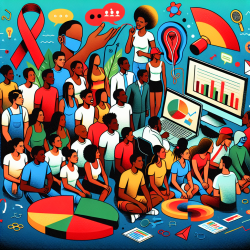Implementing Early Childhood Development Strategies for Children with Disabilities

Early childhood development (ECD) is crucial for lifelong learning, health, and well-being. However, children with disabilities often face substantial risks of sub-optimal development, especially in low- and middle-income countries (LMICs). The research article "Early childhood development strategy for the world’s children with disabilities" highlights the need for a global strategy to ensure these children have equitable access to lifelong learning opportunities. This blog post outlines key takeaways from the research and provides actionable steps for practitioners to improve their skills and services.
Key Findings from the Research
The research emphasizes a comprehensive ECD framework that includes:
- A twin-track approach combining disability-inclusive and disability-focused programs
- Strong legislative support
- Guidelines for early intervention
- Family involvement
- Designated coordinating agencies
- Performance indicators
- Workforce recruitment and training
- Explicit funding mechanisms and monitoring systems
Actionable Steps for Practitioners
1. Implement a Twin-Track Approach
Incorporate both disability-inclusive and disability-focused ECD programs. This dual approach ensures that all children receive equal access to services while providing specialized support for those with disabilities.
2. Advocate for Legislative Support
Work with policymakers to establish and enforce laws that support ECD programs for children with disabilities. These laws should outline eligibility criteria, service entry points, family involvement, coordinating agencies, performance indicators, workforce training, and funding mechanisms.
3. Develop Guidelines for Early Intervention
Create and adhere to guidelines for routine newborn screening, developmental screening, diagnosis, and timely referrals. Early intervention is crucial for minimizing the impact of disabilities and improving long-term outcomes.
4. Engage Families
Involve families in the intervention process. Provide them with the necessary support and resources to participate actively in their child's development. Family-centered interventions have been shown to be more effective.
5. Establish Performance Indicators
Set clear performance indicators to measure the effectiveness of ECD programs. These indicators should include the number of children screened, identified with disabilities, enrolled in early intervention services, and attending preschool programs.
6. Secure Funding
Advocate for sustainable funding mechanisms to support ECD programs. In many LMICs, the absence of federal funding is a significant barrier to effective service delivery. Explore partnerships with donor organizations and high-income countries to secure financial support.
7. Monitor and Evaluate
Implement a robust monitoring and accountability system. This system should track the number of children screened, identified with disabilities, enrolled in early intervention services, and attending preschool programs. Use this data to improve program effectiveness continually.
Encouraging Further Research
While the research provides a solid foundation, further studies are needed to adapt these strategies to different cultural and socio-economic contexts. Practitioners are encouraged to participate in or initiate research projects to explore innovative approaches and share best practices.
Conclusion
Implementing a comprehensive ECD strategy for children with disabilities requires a multi-faceted approach involving legislative support, family involvement, and sustainable funding. By adopting these practices, practitioners can significantly improve the quality of life and learning opportunities for children with disabilities.To read the original research paper, please follow this link:
Early childhood development strategy for the world’s children with disabilities.
Citation: Olusanya, B. O., Wright, S. M., Smythe, T., Khetani, M. A., Moreno-Angarita, M., Gulati, S., Brinkman, S. A., Almasri, N. A., Figueiredo, M., Giudici, L. B., Olorunmoteni, O., Lynch, P., Berman, B., Williams, A. N., Olusanya, J. O., Wertlieb, D., Davis, A. C., Hadders-Algra, M., & Gladstone, M. J. (2024). Early childhood development strategy for the world’s children with disabilities. Frontiers in Public Health, 10, 1390107. https://doi.org/10.3389/fpubh.2024.1390107










